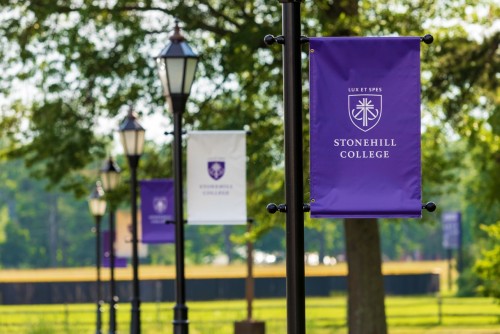The Science of Studying
Two wins come from one professor’s study of studying: Better GPAs and valuable student research opportunities.
For generations, college students preparing for exams have carried on the tradition of caffeine-fueled all-nighters, which sometimes leave them feeling like they know less than when they started.
Christopher Poirier, a professor of psychology at Stonehill, has made it his mission to equip them with better tools and habits. The secret? Harness the power of brain science.
Though study practices such as cramming and putting yourself into pre-exam isolation are commonplace, these study techniques are not supported by empirical research. As such, students may be doing themselves a disservice by using them.
“Unfortunately, there’s a disconnect between research on human learning and students’ study strategies,” said Poirier. “We’ve spent decades analyzing these issues, but many students rely on ineffective study strategies.”
To combat this issue, Poirier has spent several semesters investigating Stonehill instructors’ and students’ knowledge of effective study strategies. He shared the fruits of his labor at a 2020 Faculty Research Forum attended by both students and instructors.
Students present at this seminar on effective studying added several new test preparation techniques to their arsenal, including spreading out preparation time, self-testing and interleaving (exposing oneself to multiple related concepts at a time).
Adopting Good Habits and Recruiting Faculty Coaches
Such seminars and Poirier’s work with other professors to encourage them toward nurturing better study habits, have great potential for increasing students’ GPA.
The progress comes after years of research, including two surveys Poirier developed to collect data on study techniques. One survey, administered to psychology majors, tested their use of empirically supported study strategies.
Survey results reveal that data on Stonehill students are similar to data on the use of effective study strategies accrued from larger institutions. For instance, 74 percent of Stonehill students reported self-testing before exams, compared to 72 percent who reported doing so in a 2016 study completed by researchers at Kent State University and Colorado State University, which Poirier replicated as part of his research.
Poirier’s other survey, given to Stonehill faculty, measured their endorsement of effective study strategies. His team found that 93 percent of professors discuss study techniques in class, which is extremely encouraging.
To help combat ineffective studying, Poirier’s study suggests instructors assist students by providing sample study schedules, administering frequent quizzes/tests, giving practice questions to students, and revisiting previously taught content at the beginning of every class.
Creating pathways to future success
Poirier’s research serves two important goals. First, it provides insight into how students are studying. Second, because Poirier conducted his study in partnership with student assistants, he connects them with meaningful professional research opportunities.
“Students who work in my lab are engaged in the entire research process, from coming up with a question of interest to drawing conclusions,” he said. “They learn how to collect and analyze data and how to write scientific papers.”
In addition to developing the survey used to examine knowledge of effective study strategies, Poirier’s students also joined their professor at an Association for Psychological Science conference in Washington, D.C., where they shared their work with other researchers.
Psychology major and sociology minor Abigail Moretti ’20 was one of Poirier’s research assistants. She said Poirier gives students autonomy to come up with ideas and tackle problems in their own way.
“Professor Poirier cares about student input,” she said. “He’s supportive, but gives us a lot of independence. He’s there if we have questions, but gives us the freedom to handle tasks on our own, which has been beneficial to my learning.”
Students continue to benefit from their involvement in this study as they work with Poirier to write up a manuscript detailing the research, which they hope to publish.
Though he hasn’t worked out specific details, Poirier plans to follow up this study with another. Moving forward, students will maintain involvement in his research, he said.
Psychology major and Education Studies minor Loren (Shelly) Jarman ’20 believes her continued participation in this project has set her up for success in a possible future career as a child clinical psychologist.
“Experiential learning opportunities like this are the best way to learn,” she said. “Applying concepts I’ve learned in the classroom is beneficial because it helps me master research skills in a way that simply listening to a lecture cannot.”
Related
-
Request Information
Sign up now to be added to our mailing list, and we will show you how Stonehill could become part of your story.
-
Visit Opportunities
Our visit programs will help give you a better understanding of how Stonehill’s expansive leadership and experiential learning opportunities equip students for success in a rapidly evolving and globally competitive world.
-
Apply for Admission
Stonehill College provides an exceptional learning experience for both undergraduate and graduate students. We invite you to review the process, requirements and application deadlines for our entry options.


